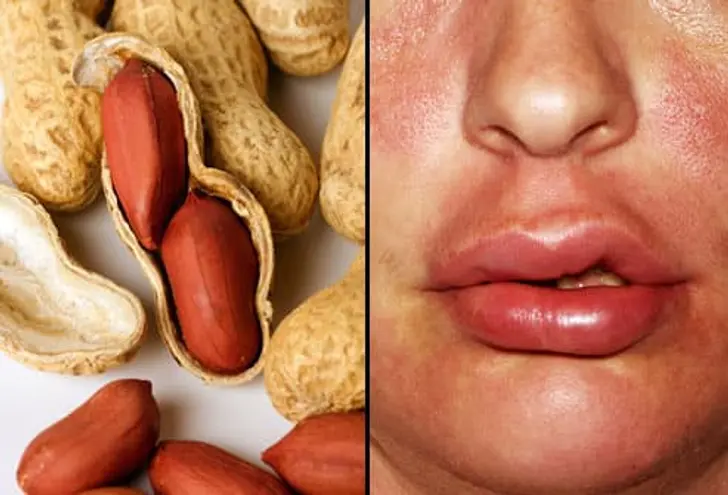Peanut Power: Early Exposure Prevents Deadly Allergies in Thousands!

A groundbreaking study suggests that over 50,000 children in the United States have avoided a diagnosis of potentially deadly peanut allergies due to early exposure to the allergen. This landmark finding stems from research conducted by experts at the Children’s Hospital of Philadelphia (CHOP), confirming the effectiveness of a public health initiative inspired by a pivotal trial a decade ago.
For many years, the incidence of food allergies, including those to peanuts and eggs, was on the rise, prompting medical professionals to advise parents against introducing these foods to their infants. However, a significant trial conducted ten years ago demonstrated that exposing babies to peanuts early in life could reduce their risk of developing an allergy by an impressive 80 percent. This revelation led the National Institute of Allergy and Infectious Diseases (NIAID) to issue formal recommendations advocating for early introduction.
Eight years after the shift in federal guidelines, CHOP researchers embarked on a comprehensive study to evaluate the real-world impact of these recommendations. They meticulously analyzed health records from over 120,000 children across nearly 50 doctor’s offices in the U.S., spanning from September 2012 to January 2020. The findings were striking: after NIAID began promoting early exposure, overall food allergies in infants decreased by 36 percent, while peanut allergies specifically saw a remarkable 43 percent drop. Researchers estimate that this initiative potentially prevented more than 57,000 children from developing food allergies, conditions that currently affect approximately one in 13 U.S. children (about 4 million) and 33 million adults.
Peanut allergies remain a major public health concern, affecting roughly two percent of children and capable of triggering anaphylaxis, a severe and potentially fatal allergic reaction characterized by a sudden drop in blood pressure and difficulty breathing. Anaphylaxis claims the lives of approximately 200 Americans annually if not treated immediately.
Dr. David Hill, senior study author and attending allergist at CHOP, expressed enthusiasm about the results, stating, “It was exciting to see real-world confirmation that early introduction is working on a national scale. For the first time, we’re seeing fewer kids developing peanut allergies.” He further noted, “The decline wasn’t surprising, but the magnitude of the decline was very encouraging, it shows that this public health effort is making a real difference.”
Published in the journal Pediatrics, the study divided children into different groups based on when they were first seen relative to the guidelines: “pre-guidelines” (September 2012 – October 2014), “post-guidelines” (September 2015 – August 2017), and a “post-addendum guidelines” cohort (February 2017 – January 2019), introduced in a second analysis with a one-year observation timeframe. Over 90 percent of children across all groups were between zero and four months old at initial enrollment. Researchers monitored participants for two years for conditions such as atopic dermatitis (eczema) and immunoglobulin E-mediated food allergy (IgE-FA), the most common type of food allergy. A child was considered newly allergic if formally diagnosed by a physician and prescribed an EpiPen, an intramuscular injection used to counteract severe allergic reactions.
The study confirmed that food allergy rates in children under three years old dropped from 1.5 percent between 2012 and 2015 to 0.9 percent between 2017 and 2020, representing a 36 percent decrease. Peanut allergies, specifically, showed a 43 percent reduction during the same period. Jordyn Koveleski Gorman, a licensed feeding specialist not involved in the study, commented on the findings, saying, “So many parents are terrified of introducing top allergens to their babies for fear of a reaction, so this study’s results are extremely encouraging.”

Experts believe the mechanism behind this success lies in how early introduction helps train a child’s developing immune system to recognize these foods as safe rather than harmful, thereby preventing allergic overreactions. Dr. Hill explained, “Introducing peanuts early helps the immune system learn that these foods are safe rather than dangerous.” He added that while peanuts were the first to be studied extensively, the same principle likely applies to other allergenic foods such as eggs and milk.
Looking ahead, the research team plans to investigate further how parents introduce allergens to infants—including the optimal age, frequency, and specific food forms. Koveleski Gorman also expressed hope for similar research into other common allergens such as eggs, wheat, and soy, to provide parents with comprehensive guidance. For parents introducing peanuts, she advises thinning peanut butter with water and mixing it into purees, soft solids like bananas, or serving it on a spoon, as whole peanuts pose a choking hazard for infants.
Dr. Hill emphasized the core takeaway: “Early introduction works, and we should double down on making sure every parent hears it. Consistent, accessible guidance from pediatricians and public health agencies can help ensure all families benefit from this prevention strategy.”
You may also like...
Rooney Blasts 'Crisis Mode' Liverpool: Champions Lacking Leadership and Salah's Form a Major Concern

Defending Premier League champions Liverpool are in a worrying slump, having lost four consecutive matches. Former Engla...
Real Madrid Stuns Barcelona with Clasico Masterclass; Mbappe, Bellingham Shine

Europe's top football leagues delivered a weekend of high drama, featuring Real Madrid's controversial El Clásico victor...
Daily Show Drama: Jon Stewart's Battle for Creative Freedom Amid Paramount-Skydance Merger

Jon Stewart revealed at the New Yorker Festival that he is actively seeking to extend his contract at “The Daily Show” d...
Hemsworth Breaks Silence: The Weight of Replacing Cavill in Witcher Season 4

Liam Hemsworth will debut as Geralt of Rivia in The Witcher Season 4 this Fall, replacing Henry Cavill. Hemsworth shared...
Mzoe 7's 'Fela Kuti' Spectacle: Zimbabwean Artist Redefines Music & Drama!

Mzoe 7's recent one-man show at the Bulawayo Theatre has redefined performance standards, captivating audiences with a m...
Zimbabwean Duo Bantu & Dr. Chaii Seize Apple Music's Isgubhu Spotlight!

Award-winning Zimbabwean artists Bantu and Dr. Chaii are the latest Apple Music Isgubhu cover stars, celebrated for thei...
Caroline Flack Tragedy: Mother's Heartbreak Over Texts Found on Lewis Burton's Phone

Caroline Flack's mother, Christine, is heartbroken by newly resurfaced questions surrounding texts found on Lewis Burton...
Strictly's Claudia Winkleman's Daughter: A Decade On From Horrific Halloween Accident

After 12 years, Claudia Winkleman is stepping down from Strictly Come Dancing to prioritize her family, including her da...




